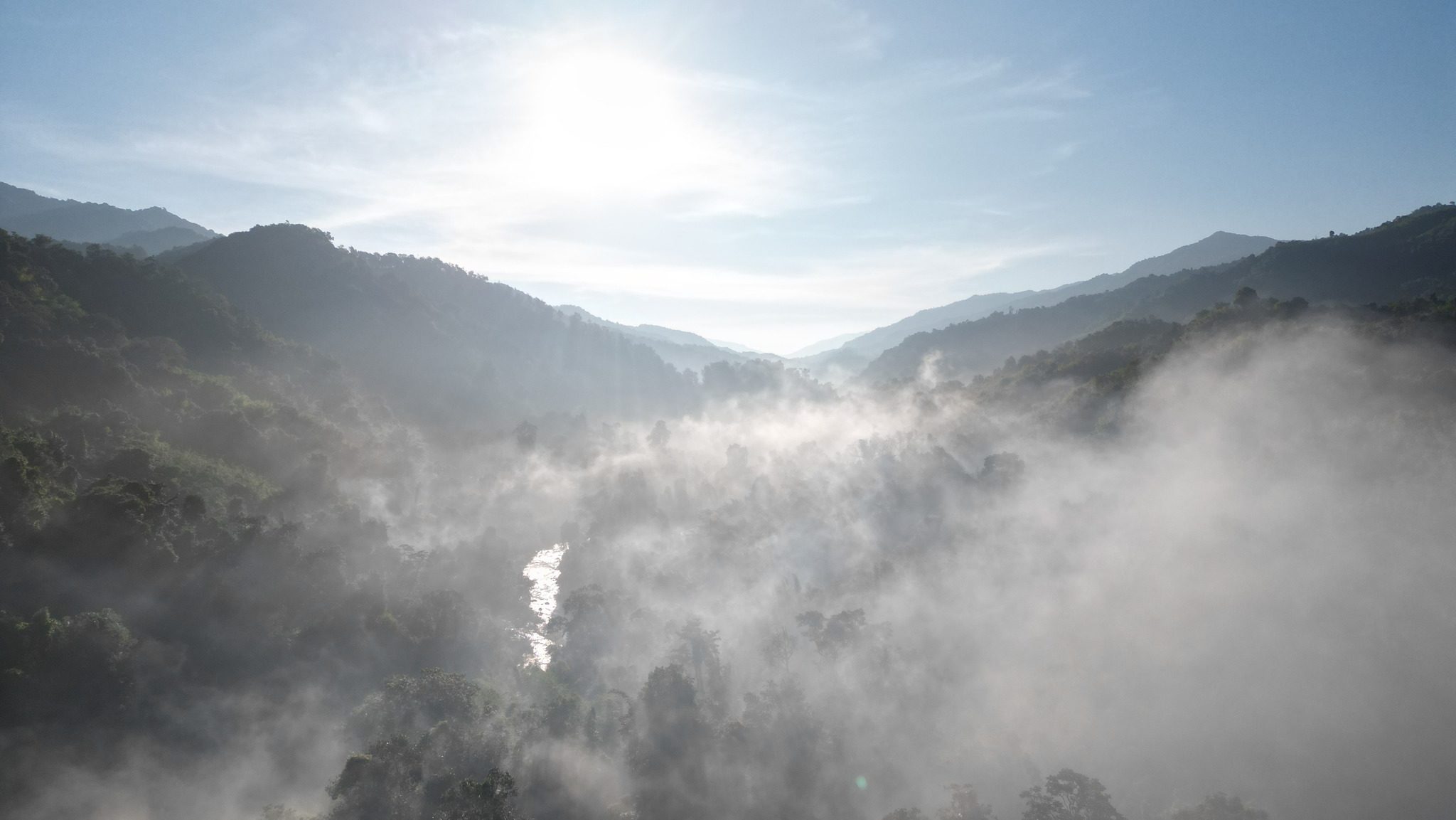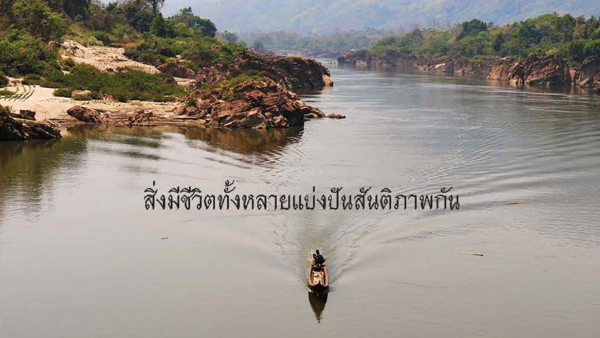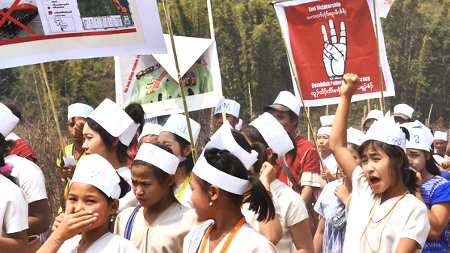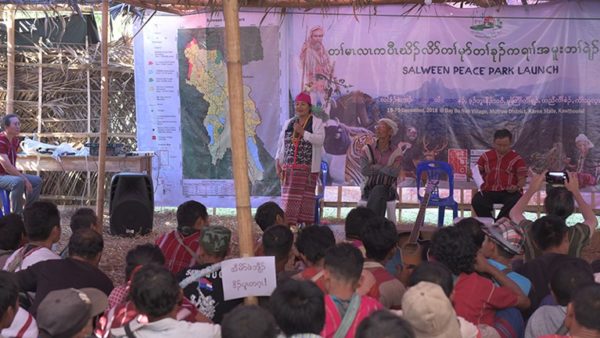The park's planning and establishment resulted from years of hard work, discussion, and coordination between communities, Karen civil society, and the Karen National Union.
First published on 12/18/2024, and last updated on 02/27/2025
Shared by Thawthi Taw Oo Indigenous Park
Karen Indigenous People in south-east Burma have declared a new 5,754 km2 conserved territory in Taw Oo District on December 10, 2024.
A statement by the new Thawthi Taw-Oo Indigenous Park says, “Karen tribes such as K’nyaw Wah, Geba, Maw Nay Pwa, Paku, Mo Pwa, Bwe, and other ethnic nationalities from Taw Oo District of Kawthoolei” have proudly celebrated the declaration of the Thawthi Taw Oo Indigenous Park.
The park “is home to more than 100,000 Indigenous Karen alongside a cornucopia of plant and animal species,” it reads.
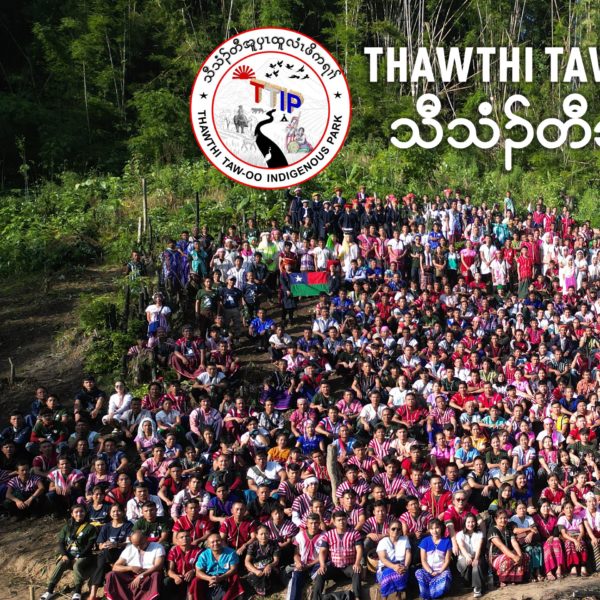
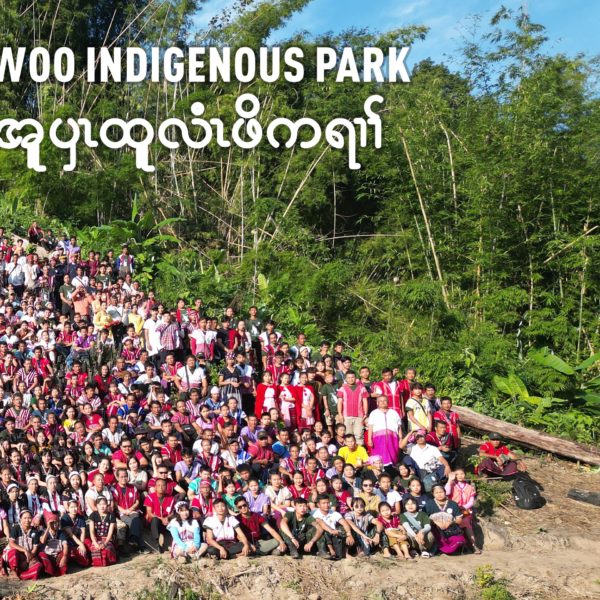
Situated in the Indo-Burma Global Biodiversity Hotspot and the Dawna Tenasserim Landscape, the park will protect a globally crucial natural ecosystem and Indigenous Karen cultures, which have stewarded this landscape for generations.
Read the complete statement here (PDF file).
Thawthi TawOo Indigenous Park (1421967 is the second Karen Indigenous Community Conserved Territory after Salween Peace Park (1667355 acres).
Please click here (PDF file) for the complete Karen Indigenous Community Conserved Territory briefing.
Below, we are sharing the full report about the declaration ceremony as shared by Thawthi Taw-Oo Indigenous Park (without any changes in the text.)
The Thawthi Taw-Oo Indigenous Park: The Birth of the second Indigenous Karen Conserved Territory
“𝐵𝑜𝑟𝑛 𝑖𝑛 𝑡ℎ𝑖𝑠 𝑐𝑜𝑢𝑛𝑡𝑟𝑦 𝑘𝑛𝑜𝑤𝑛 𝑎𝑠 𝐵𝑢𝑟𝑚𝑎, 𝑤𝑒 𝑡ℎ𝑒 𝐼𝑛𝑑𝑖𝑔𝑒𝑛𝑜𝑢𝑠 𝑝𝑒𝑜𝑝𝑙𝑒 ℎ𝑎𝑣𝑒 𝑛𝑒𝑣𝑒𝑟 ℎ𝑎𝑑 𝑜𝑢𝑟 𝑟𝑖𝑔ℎ𝑡𝑠. 𝑊𝑒 𝑎𝑟𝑒 𝑟𝑒𝑔𝑎𝑟𝑑𝑒𝑑 𝑎𝑠 𝑠𝑡𝑎𝑡𝑒𝑙𝑒𝑠𝑠 𝑤𝑖𝑡ℎ 𝑛𝑜 𝑐𝑜𝑢𝑛𝑡𝑟𝑦, 𝑙𝑎𝑛𝑑 𝑎𝑛𝑑 𝑙𝑖𝑡𝑒𝑟𝑎𝑐𝑦. 𝑊𝑒 𝑤𝑒 𝑚𝑢𝑠𝑡 𝑟𝑒𝑐𝑙𝑎𝑖𝑚 𝑜𝑢𝑟 𝑟𝑖𝑔ℎ𝑡𝑠.”
After seven years of collective effort and dedication, on 10th December 2024, the Indigenous Karen peoples of Taw-Oo district, Kawthoolei, south-east Burma have finally declared their Indigenous community conserved territory called ‘Thawthi Taw-Oo Indigenous Park’ or TTIP.
The three days long event, which started on10th and continued until 12th December 2024, was held by Thawthi Taw-Oo Indigenous Park’s Steering Committee to bring together people across TTIP to officially declare the park. The event was attended by 1500 people included representatives from six Indigenous Karen tribes and other ethnic groups, local indigenous communities, Karen National Union (KNU) from central and local level, community-based organizations, religious leaders, other ethnic communities, different religious leaders and representatives from different districts under KNU administration.

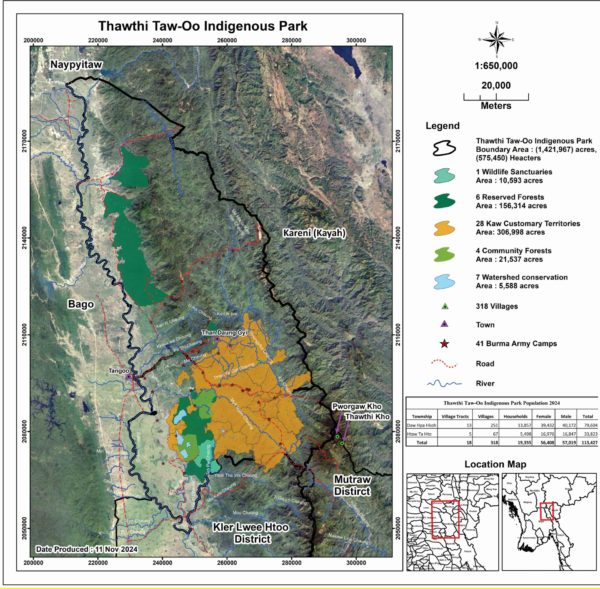
Following the declaration, the event featured culture sharing and performances by TTIP’s different Indigenous tribes, a TTIP theme song competition, a panel discussion on TTIP’s development process, a certificate award for watershed conservation area, an on the political situation by leaders and other assorted activities.
In his opening speech, P’doh Saw Eh Wah, a chairperson of TTIP Steering Committee as well as secretary of KNU’ Taw Oo district said;
“Born in this country known as Burma, we the Indigenous people have never had our rights. There are no Indigenous Peoples’ rights mentioned in either the country’s constitution or national laws. We are regarded as stateless with no country, land and literacy. Our lands are being labeled as vacant/fallow lands which can be given to companies at any time in the name of development. This is a big threat for us. So, if the leaders of the country where we live do not recognize our rights, then we must find a way to assert our own rights. According to the United Nations and its UNDRIP, we the Indigenous People have the rights to manage our lands, territory, and practice our culture and traditions. Therefore, we must first acknowledge that we inherit these rights, and we must reclaim our rights through these international platforms.”
Rooted in these long-held traditions, the TTIP holds four key aims: (1) to revitalize and protect Taw-Oo Indigenous Peoples’ traditions, culture and unique worldview, (2) to strengthen Indigenous Peoples’ governance and management of their ancestral territories and natural resources, (3) to preserve the biocultural diversity of Taw-Oo so that its rich ecological system can continue to thrive and benefit both present and future generations, and (4) to enable the Indigenous Peoples of Taw-Oo to determine their own sustainable development path.
As Indigenous people in Taw-Oo district declared TTIP, the central KNU also released its own declaration to show its recognition and support for TTIP. Read out by P’doh Saw Thaw Thi Bwe, Joint Secretary (1) of KNU during the ceremony, the declaration stated:
“We, the KNU, in our capacity as the sovereign authority in Kawthoolei, with our legitimacy based on the historical and living agreement and confidence of the Karen and non-Karen peoples and communities inhabiting this precious land and territory, and with our governance emerging from their aspirations and initiatives and efforts, hereby declare, with profound admiration and appreciation, and in respect of nature which has nurtured our people for generations, and in recognition of its role in contributing to a lasting peace, in preserving our unique cultural heritage, and in representing the aspirations for peace, justice and self-determination of our people, our full and unwavering recognition of the Thawthi Taw-Oo Indigenous Park.”
Following the Salween Peace Park which was declared on 18th December 2018, the newly-declared Thawthi Thaw-Oo Indigenous Park is the second Indigenous Peoples conserved territory established by the Indigenous Karen people in Kawthoolei, Burma. It is a home to more than 100,000 Indigenous Karen peoples including six Karen tribes such as Kanyaw Wah (White Karen), Geba, Paku, Maw Nay Pwa, Bwe, and Mo Pwa as well as other ethnic communities including Pa’O Shan, Karenni, and Burmese, among others.
In his speech, Brigadier General Saw Deh Poe, chairperson of KNU Taw Oo district said;
“We the Indigenous Karen People are not the only ones who live in Thawthi Taw-Oo Indigenous Park. Our brothers and sisters like Shan, Pa’O, Burmese, and many others are living in this territory. As we are living together, everyone should have equal rights. Everyone should get involved in the decision making. We all have a responsibility to make this happen.”
Covering 5,754 km2 (1,421,967 Acres) of healthy forests, free flowing rivers, and towering mountains in Taw Oo District, the TTIP is a diverse and healthy ecosystem that has been stewarded by local communities for generations. Populations of rare wildlife including tigers, gaur, long-tailed goral, and banteng live in harmony with local communities, who continue to practice their traditional forest-based Kaw governance systems. Situated in the Indo-Burma Global Biodiversity Hotspot, and the Dawna Tenasserim Landscape, the TTIP will protect a globally important natural ecosystem, and our Indigenous Karen cultures that have stewarded this landscape for generations.
According to the presentation given by secretary of TTIP Steering Committee, P’doh Saw Thaw Tu Htoo during the ceremony, the TTIP will establish governance that is decentralized, strongly supports the equal rights of women and men to political participation and representation, and ensures the continuous and ongoing involvement of local communities in all decision-making procedures. To form this democratic and inclusive governance for the park, 36 Indigenous community representatives, 12 Ethnic group representatives, 14 representatives from Karen civil society, and 37 representatives from the Karen National Union will be elected through popular vote. These 99 representatives will become members of TTIP’s General Assembly. Then 11 people will be elected among these 99 representatives during the General Assembly to join the TTIP Governing Committee.
P’doh Naw Selah, member of TTIP’s Steering Committee said;
“In the governance of TTIP, men are not the only people in the governing body. Women are also taking key roles in the leadership. Among 36 indigenous community representatives, there must be 18 women. Among 12 Ethnic group representatives, there must be 6 women. Among 14 Karen CBO/CSOs representatives, there must be 7 women. So if we look at this governance, the percentage of women involvement is not less than 30%.”
Founded upon and continuously guided by these governing principles, the TTIP seeks to demonstrate the value of Indigenous approaches to governance in a time marked by intensified conflict and climate crisis.
Since 2018, due to the persistent efforts of the TTIP Steering Committee, local indigenous people, and community-based organizations, today TTIP has successfully demarcated and revitalized 33 Indigenous Karen ancestral territories known as Kaw, 1 wildlife sanctuary, 4 community forests, 7 watershed conservation areas, and 6 reserved forests.
“We the Indigenous Karen communities of Taw Oo (a.k.a. Toungoo District) call on the peoples of Burma (a.k.a. Myanmar), the International Community, and the peoples of the world to be inspired. There are many paths to a peaceful and democratic future, and to ending the growing climate emergency. Today, through the TTIP, we have taken a step towards our vision of this future, where humans and nature can live in peace.” said TTIP statement that released on 15 December 2024.
The journey will continue.
